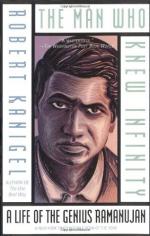|
This section contains 522 words (approx. 2 pages at 400 words per page) |

|
The Man Who Knew Infinity: A Life of the Genius, Ramanujan Summary & Study Guide Description
The Man Who Knew Infinity: A Life of the Genius, Ramanujan Summary & Study Guide includes comprehensive information and analysis to help you understand the book. This study guide contains the following sections:
This detailed literature summary also contains Topics for Discussion and a Free Quiz on The Man Who Knew Infinity: A Life of the Genius, Ramanujan by Robert Kanigel.
The Man Who Knew Infinity is a book about two important mathematicians, their relationship, and how it shaped their lived and the world around them. One of these men, Ramanujan was a genius of unusual strength who would go on to develop some of the most interesting mathematical conjectures and theorems of the century, if not of all time. Yet he had only the most bare education in backwaters of South India. The other man, G. H. Hardy, was the most respected English mathematician of his day and the product of the best schools in England. Ramanujan was a genius, but it took Hardy to recognize and bring the young man to England. For several years, their collaborations at Cambridge produced mathematical research that is still be mined today for interesting results.
The book begins in South India where Ramanujan was born and lived most of his life. He came from a poor family in an obscure village outside of the South Indian capital of Madras. His family was poor but they were also members of the most distinguished part of Indian society, a caste known as Brahmins. For centuries the Brahmins were the priests and educated class of Hindu India and in Ramanujan's time, they continued to strictly observe their strict regimens of purity and religious devotion. By all accounts, Ramanujan was a strict Brahmin his whole life. Early on however, he developed an interest in mathematics but lacking any real formal education in the subject, his knowledge of mathematics was drawn almost exclusively from one book he found as a young man. Soon he was devoting all of his time to his mathematical research to the exclusion of school and work. Lacking a degree or a good job, Ramanujan began to send his research to English mathematicians, hoping that they might take an interest in his work.
Many English mathematicians dismissed the letters as not worth pursuing but G. H. Hardy, one of the most distinguished mathematicians of his time took them seriously and contacted the young man. Eventually Hardy, convinced of Ramanujan's genius, arranged to have Ramanujan come to Cambridge. Once the young man arrived, Hardy and Ramanujan developed some of the most important math of the century. Despite his success in mathematics, the devout Brahmin Ramanujan was alienated in England. His strict devotion to his vegetarian diet, his lack of exercise, and his long hours of work led to an eventual physical breakdown. Ramanujan fell ill with what some doctors believed to be tuberculosis. After improving to a degree, Ramanujan returned to India.
Once in India, Ramanujan found his family in disorder. His wife from an arranged marriage was fighting with his mother and no one seemed to get along. In this atmosphere, Ramanujan fell ill again and this time unfortunately, he did not recover. He died at the young age of thirty, continuing to do mathematics until the day he died. He never saw his friend Hardy again and years later when Hardy was himself near death, Hardy would claim that the best work of his life was to discover and help Ramanujan.
Read more from the Study Guide
|
This section contains 522 words (approx. 2 pages at 400 words per page) |

|



